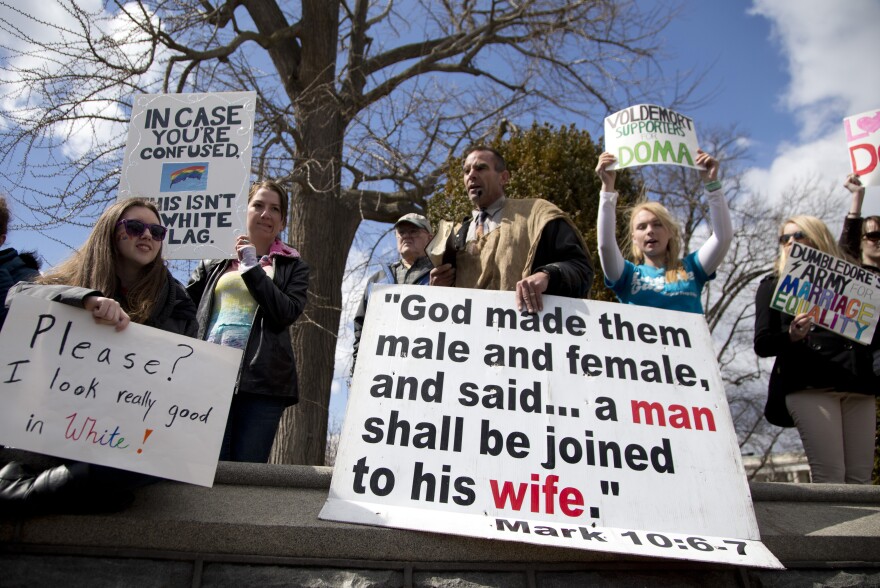The dual victories the Supreme Court handed to gay-marriage supporters Wednesday seemed to temporarily shift the focus of the fight from Washington to the states.
For instance, one of the more notable reactions to the Supreme Court decisions overturning the Defense of Marriage Act and upholding a lower court ruling that blocked California's Proposition 8 from taking effect came from the American Civil Liberties Union.
The ACLU announced Wednesday it had hired well-connected GOP political strategist Steve Schmidt, who worked for President George W. Bush and was a senior adviser to Sen. John McCain's 2008 presidential campaign, to lead an effort to gain Republican support for gay marriage in the states. The civil liberties group, which helped represent plaintiff Edie Windsor in the case that overturned DOMA, said it had amassed a $10 million war chest for the effort.
The ACLU said it had also hired Jimmy LaSalvia, founder of the gay-rights group GOProud, in an attempt to add conservatives to its coalition to overturn state bans.
In its statement, the ACLU explained:
"Schmidt's role will be to help spearhead the campaign to strike down state-based laws prohibiting same-sex marriage. The campaign will, over the next four years, challenge legislative and constitutional provisions in states such as Illinois, Oregon, Hawaii, New Mexico, and others. The ACLU aims to spend roughly $10 million through 2016 and will officially announce the initiative with an ad in tomorrow's edition of The Wall Street Journal."
Meanwhile, David Boies, a supporter of Democratic causes and one of two famous lawyers who represented Proposition 8 opponents (the other was Ted Olson, a conservative Republican and former U.S. solicitor general), also made clear that after Wednesday's court rulings he saw the gay-rights battles largely shifting to the states.
In a Bloomberg TV interview, Boies said:
"The next step is to be sure that this marriage equality is extended to every one of the 50 states. The United States Supreme Court made clear today that you have a right to marry, that there is no basis for discrimination."
Boies said his read of the Supreme Court opinions, especially Justice Antonin Scalia's dissent, suggested that even Scalia interpreted the court's majority as ruling that there was "a right to marry in every one of the 50 states."
Boies added: "Tomorrow, we will sit down and figure out what is the way to most quickly bring marriage equality to all 50 states. ... There are people all over this country that are litigating these issues. There are enough people who believe in marriage equality to bring that issue to every state in this country. And hopefully what you will find is that after today's opinion, states will voluntarily adopt marriage equality."
But as much as supporters of same-sex marriage looked to intensify the fight in the states, opponents also placed their hopes on the states to slow or stop any momentum the other side gained.
In their view, the Supreme Court did no such thing as recognize a constitutional right to marry.
At a Capitol Hill news conference, Rep. Tim Huelskamp, a Kansas Republican, said:
"One good thing out of the decision was the court did not declare that there was a constitutional right for same-sex marriage. ... The state of Kansas will be able to maintain its marriage amendment which I helped author a number of years ago."
Rep. Vicky Hartzler, a Missouri Republican, suggested that when it comes to the states, the numbers are on their side:
"Thirty-eight states have affirmed the belief of their citizens that marriage exists between a man and a woman and is a necessary building block of a stable society. The debate over marriage will continue with the states leading the way. We must work to defend the right of Americans to make marriage policy."
House Majority Leader Eric Cantor also pointed beyond Washington to salvage matters for those opposed to same-sex marriage. Though a brief statement, it was significant, since he made no suggestion that the GOP-controlled House would take another run at a same-sex marriage law:
"I'm disappointed in this decision, and the marriage debate will continue in the states."
Copyright 2020 NPR. To see more, visit https://www.npr.org. 9(MDAyNDY5ODMwMDEyMjg3NjMzMTE1ZjE2MA001))





